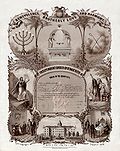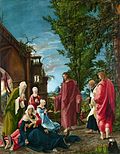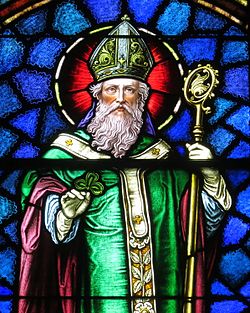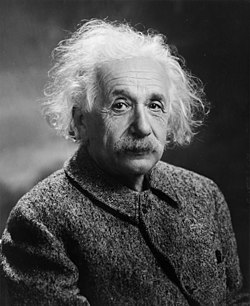Portal:Religion
The Religion Portal
Religion is a range of social-cultural systems, including designated behaviors and practices, morals, beliefs, worldviews, texts, sanctified places, prophecies, ethics, or organizations, that generally relate humanity to supernatural, transcendental, and spiritual elements—although there is no scholarly consensus over what precisely constitutes a religion. It is an essentially contested concept. Different religions may or may not contain various elements ranging from the divine, sacredness, faith, and a supernatural being or beings. (Full article...)
 Vital article
Vital article

The soul is the purported immaterial aspect or essence of a living being. It is typically believed to be immortal and to exist apart from the material world. The three main theories that describe the relationship between the soul and the body are interactionism, parallelism, and epiphenomenalism. Anthropologists and psychologists have found that most humans are naturally inclined to believe in the existence of the soul and that they have interculturally distinguished between souls and bodies. (Full article...)
 Did you know (auto-generated)
Did you know (auto-generated)
- ... that Freedom of Religion South Africa filed an unsuccessful lawsuit to keep child spanking legal?
- ... that across his thirty-six collections, fashion designer Alexander McQueen contemplated religion, told fairy tales, and criticized the fashion industry?
- ... that religious studies scholar C. Jouco Bleeker believed that religions are like acorns?
- ... that a religious community is a group of people who practice the same religion, but do not have to live together?
- ... that the nonconformist minister Ichabod Chauncey was banished from England under the Religion Act 1592 and spent two years in exile in Holland where he published a defence of his actions?
- ... that the Grave with the Hands commemorates a married couple, divided by society and religion, with hands clasped over a cemetery wall after death?

Egyptian temples were built for the official worship of the gods and in commemoration of the pharaohs in ancient Egypt and regions under Egyptian control. Temples were seen as houses for the gods or kings to whom they were dedicated. Within them, the Egyptians performed the central rituals of Egyptian religion: giving offerings to the gods, reenacting their mythology through festivals, and warding off the forces of chaos. These rituals were seen as necessary for the gods to continue to uphold maat, the divine order of the universe. Caring for the gods was the obligations of pharaohs, who dedicated prodigious resources to temple construction and maintenance. Pharaohs delegated most of their ritual duties to priests, but most of the populace was excluded from direct participation in ceremonies and forbidden to enter a temple's most sacred areas. Nevertheless, a temple was an important religious site for all classes of Egyptians, who went there to pray, give offerings, and seek oracular guidance. (Full article...)


































































